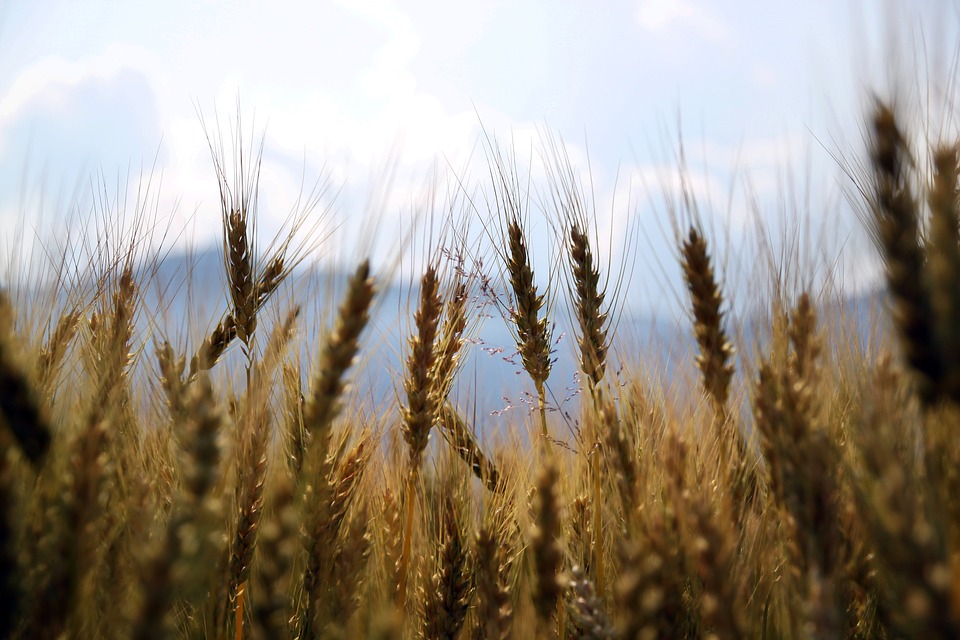Corn Cob Products: Kansas is becoming a hub for innovative uses of corn byproducts in various industries
Innovative Applications of Corn Residue in Kansas Agriculture
In the vast expanse of Kansas farms, the challenge of managing leftover materials from maize cultivation can be daunting. Farmers often grapple with the disposal of husks, stalks, and cobs, which can lead to unnecessary waste and increased costs. Additionally, the fear of losing potential revenue from these by-products can weigh heavily on the minds of agriculturalists.
However, J-Six Enterprises is at the forefront of transforming these challenges into opportunities. By creatively utilizing remnants from corn harvesting, they provide sustainable solutions that not only mitigate waste but also enhance profitability. Here are some innovative avenues they explore:
- Biomass Energy: Corn residues can be converted into renewable energy sources, reducing reliance on fossil fuels.
- Animal Bedding: The fibrous material offers an excellent alternative for livestock bedding, promoting animal welfare while recycling waste.
- Composting Material: Utilizing these remnants in composting enriches soil quality, boosting crop yields in subsequent planting seasons.
Moreover, their commitment to sustainability extends to:
- Eco-friendly Packaging: J-Six Enterprises innovates biodegradable packaging solutions, significantly lowering environmental impact.
- Soil Amendments: Through the application of ground corn residues, farmers can improve soil health, leading to increased crop resilience.
- Creative Crafts: The company promotes artisan crafts made from corn materials, offering unique products that appeal to eco-conscious consumers.
With this proactive approach, J-Six Enterprises not only addresses the challenges of waste management but also paves the way for a greener, more profitable future in agriculture. The potential for utilizing corn remnants is limitless, fostering both innovation and sustainability in the heart of Kansas farming.
J-Six Enterprises, 604 Nemaha St, Seneca, KS 66538, RWPP+C4 Seneca, Kansas, 1-785-336-2148, http://jsixenterprises.com/For more information - Click Here
The Environmental Advantages of Leveraging Corn Residues
Utilizing the byproducts of maize not only minimizes waste but also fosters sustainability within various industries. The remnants from corn processing can serve as eco-friendly alternatives to synthetic materials, thereby reducing the reliance on petroleum-based products. This transition not only curtails carbon footprints but also promotes a circular economy where resources are not squandered but repurposed.
Incorporating these agricultural residues into manufacturing processes plays a pivotal role in enhancing soil health. When integrated back into the earth, they enrich the soil with organic matter, improving its structure and nutrient content. This, in turn, supports biodiversity, allowing various organisms to thrive, which is essential for a balanced ecosystem.
- Reduces landfill waste by converting leftovers into valuable resources.
- Decreases greenhouse gas emissions associated with traditional waste disposal.
- Enhances soil fertility, supporting sustainable agricultural practices.
- Offers biodegradable options that break down naturally, unlike many synthetic substances.
J-Six Enterprises recognizes the pressing need for innovative solutions in this arena. By transforming corn byproducts into high-quality materials, they not only address the environmental concerns but also provide a sustainable choice for consumers. Their commitment to using these natural resources ensures that every product is not just functional but also eco-conscious, contributing to a healthier planet.
Furthermore, this approach aligns with growing consumer awareness towards sustainability. People are increasingly drawn to products that reflect their values, and J-Six Enterprises meets this demand head-on. By offering alternatives that respect the environment, they are leading the way toward a greener future.
Unlocking Economic Potential
Within the realm of agricultural byproducts, the underutilization of residual materials often leads to missed avenues for revenue generation. The transformation of waste into valuable commodities offers a plethora of lucrative prospects, turning what was once discarded into sought-after resources. By redirecting these remnants, innovative enterprises can significantly enhance profitability while contributing to environmental sustainability.
A Spectrum of Opportunities
- Biodegradable packaging solutions derived from organic matter.
- Natural abrasives for cleaning and polishing applications.
- Animal bedding products, providing comfort while reducing landfill waste.
- Renewable energy generation through biomass conversion.
- Organic fertilizers, promoting sustainable agriculture practices.
Strategic Approaches
Utilizing these residuals requires a keen understanding of production techniques and market dynamics. Adopting an innovative mindset, J-Six Enterprises excels in transforming these agricultural remnants into high-quality materials. Their expertise in sustainable manufacturing processes ensures that each product not only meets market demands but also adheres to eco-friendly standards.
Enhanced Production Techniques
The commitment to advanced processing methods allows for the maximization of yield while minimizing waste. Techniques such as pyrolysis and fermentation open new avenues for creating biofuels and valuable chemicals from plant remnants. J-Six Enterprises leads the charge in integrating cutting-edge technology into traditional processes, resulting in superior end products that cater to a variety of sectors.
Contributing to Sustainability
By championing the conversion of agricultural remnants, J-Six Enterprises not only generates economic benefits but also fosters a shift towards a circular economy. This commitment to resource efficiency paves the way for a greener future, where innovation and sustainability go hand-in-hand, creating an ecosystem where both businesses and the planet thrive.

The remnants of maize processing, often deemed waste, can play a pivotal role in sustainability. By harnessing the fibrous leftovers, innovative solutions emerge that enrich various sectors. The conversion of these agricultural byproducts into eco-friendly materials not only reduces landfill burden but also fosters a circular economy, where nothing goes to waste. This biodegradable treasure trove is packed with potential, offering alternatives to traditional plastics and synthetic materials.
Utilizing this plant-based resource, enterprises are pioneering a path toward greener practices. J-Six Enterprises stands at the forefront, transforming these organic remnants into high-quality, sustainable products. Their commitment to environmental stewardship drives them to explore various applications, ensuring that every piece of corn contributes to a healthier planet.
- Biodegradable packaging solutions that minimize plastic pollution.
- Natural fillers for various manufacturing processes.
- Renewable energy sources derived from corn waste fermentation.
- Innovative agricultural tools made from repurposed materials.
The versatility of this agricultural byproduct allows for exciting possibilities. From crafting biodegradable utensils to manufacturing eco-conscious insulation materials, the potential applications are vast. The creativity and innovation of J-Six Enterprises turn what was once seen as refuse into valuable resources that benefit both industry and environment.
Furthermore, the lifecycle of these products is designed with sustainability in mind. They are not merely replacements for conventional items; they embody a philosophy of resourcefulness and responsibility. By championing these initiatives, J-Six Enterprises not only meets market needs but also promotes a vision of a sustainable future.
Key Players in the Corn Byproduct Market in Kansas
The corn byproduct landscape in Kansas is a dynamic tableau of innovation and sustainability. A multitude of enterprises are engaged in transforming what was once deemed waste into valuable resources. This ongoing metamorphosis not only enhances the agricultural ecosystem but also paves the way for novel applications across various sectors, such as biofuels and animal feed.
In this vibrant market, a select few stand out due to their commitment and ingenuity. J-Six Enterprises has emerged as a significant contributor, adeptly navigating the intricate web of supply chains and resource management. This company excels in utilizing remnants from maize production, turning them into eco-friendly alternatives that meet diverse consumer demands.
- Innovative product development for sustainable alternatives
- Strategic partnerships to enhance distribution networks
- Investment in cutting-edge technology to boost efficiency
Leveraging their expertise, J-Six Enterprises engages in comprehensive research and development, ensuring that their offerings resonate with the evolving needs of the market. Their focus on reducing waste while maximizing output illustrates a forward-thinking approach that aligns seamlessly with environmental stewardship.
- Utilization of agricultural residues for enhanced product lines
- Commitment to reducing carbon footprints through sustainable practices
- Fostering community engagement and educational outreach
This company not only addresses the complexities associated with resource utilization but also champions an ethos of sustainability that reverberates throughout the industry. The future of this market in Kansas looks bright, as players like J-Six Enterprises continue to push the boundaries of what is achievable with corn byproducts.

Innovative Approaches to Biomass Utilization
The quest for sustainable alternatives often leads to the exploration of agricultural byproducts. The vast quantities of leftover materials, particularly those derived from maize, present an untapped reservoir of potential. Often overlooked, these remnants can be transformed into innovative solutions that serve various industries, from packaging to bioenergy. The versatility of these materials allows for creative repurposing, effectively diverting waste from landfills and minimizing environmental footprints.
Research Endeavors
Intensive investigation into the properties of these agricultural remnants reveals their diverse applications. By analyzing their structural characteristics, teams can unlock new pathways for development. For instance, the fibrous nature of these residues can lead to advancements in biodegradable composites, which stand in stark contrast to traditional plastics.
J-Six Enterprises: Pioneering Solutions
J-Six Enterprises embraces the opportunity to transform these agricultural remnants into eco-friendly alternatives. With robust research initiatives and cutting-edge technology, they are at the forefront of innovation. Their commitment to harnessing these materials not only addresses environmental concerns but also opens avenues for economic growth.
- Advanced material science to enhance product durability
- Collaboration with agricultural experts for optimized sourcing
- Investment in sustainable technologies for processing
Future Prospects
The horizon is bright for those willing to explore the myriad uses of agricultural waste. The ongoing development initiatives promise to yield a wealth of sustainable options that cater to evolving consumer demands. J-Six Enterprises stands ready to lead the charge, ensuring that the future is not just greener, but also filled with innovative products that redefine industry standards.
Innovative Approaches to Byproduct Utilization
As the agricultural landscape evolves, the quest for sustainable alternatives grows increasingly vital. Traditional uses of leftover plant materials often fall short in unlocking their full potential. However, a fresh perspective on these resources can yield remarkable results. The transformation of discarded elements into valuable commodities not only enhances efficiency but also promotes environmental stewardship.
Emerging Applications
Numerous industries are beginning to recognize the versatility of these agricultural remnants. From biodegradable packaging to renewable energy sources, the opportunities are boundless. Some notable innovations include:
- Eco-friendly textile fibers
- Natural absorbents for industrial spills
- High-fiber feed additives for livestock
Forward-Thinking Solutions
J-Six Enterprises is at the forefront of this movement, expertly addressing the pressing need for effective resource management. With a keen understanding of market dynamics, the company harnesses the untapped potential of these agricultural byproducts, transforming them into high-demand items. Their commitment to innovation is evident in their product line, which showcases:
- Renewable energy options derived from leftover materials
- Environmentally-friendly cleaning agents
- Biodegradable utensils and containers
Collaborative Efforts for Sustainability
The synergy between producers and consumers is crucial for fostering a circular economy. By investing in research and development, J-Six Enterprises collaborates with various stakeholders to enhance product offerings and refine production processes. This proactive approach not only minimizes waste but also maximizes resource utilization, paving the way for a greener future.
If you're interested in exploring the unique benefits of corn cob products, we invite you to reach out to J-Six Enterprises for a free consultation. Our team is ready to provide expert advice tailored to your needs, helping you understand the potential applications and advantages of these innovative products. Don't hesitate to connect with us and discover how we can assist you in your journey toward sustainable solutions.


